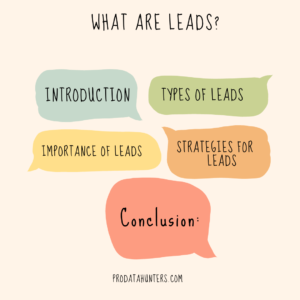
Introduction:
In the world of freelancing, producing leads is an essential component that can greatly affect your company’s performance. Potential buyers or clients who have expressed interest in your services or products are essentially known as leads. We’ll explore the idea of leads in this post, along with their significance for independent contractors and methods for handling them well so they become great opportunities.
What are leads?
In the context of sales and marketing, a “lead” refers to an individual or business that has shown interest in a product or service. Leads are potential customers who have expressed curiosity or engagement with a company’s offerings but have not yet made a purchase. The process of lead generation involves identifying and attracting individuals or entities who are likely to become customers.

Here are some key points about leads:
- Expression of Interest:
An individual who has expressed interest in a good or service is called a lead. One can express interest in this topic by doing several things, like completing a form, signing up for a subscription, or interacting with information.
- Contact Information:
To facilitate more conversation, leads often supply contact details like phone numbers or email addresses. Businesses need this information to nurture leads and move them through the sales funnel.
- Different Phases:
Leads may be in various phases of the purchasing process. While some may be closer to making a purchase choice, others may still be in the early stages, simply investigating options.
- Potential for Conversion:
Converting these prospective clients into paying clients is the ultimate objective of lead generation. Companies use a range of tactics to develop and direct prospects through the sales funnel.
- Qualification:
Depending on their degree of engagement and readiness to buy, leads can be classified as either sales-qualified leads (SQLs) or marketing-qualified leads (MQLs). While MQLs have expressed interest, they might not be prepared to purchase, but SQLs are nearing decision-making.
- Lead generation techniques:
Businesses employ a range of techniques, such as email marketing, social media engagement, content marketing, paid advertising, and more, to create leads. The goal of these techniques is to draw in and hold the interest of possible leads.
- CRM (Customer Relationship Management):
To handle and arrange lead information, many companies employ CRM systems. CRM software makes it easier to keep track of transactions, keep an eye on lead behavior, and communicate with prospective clients.
- Follow-up and nurturing:
Following up with leads, companies frequently take part in lead nurturing initiatives. This entails answering questions, giving more details, and helping prospects decide what to buy. All things considered, leads are the building blocks of a sales pipeline, and companies hoping to expand both their clientele and revenue must prioritize efficient lead creation and management.
Read more: TYPES OF LEADS
Importance of Leads for Freelancers:
i-Business Growth:
Creating a consistent stream of leads is crucial to growing your freelancing business. More leads equate to more chances to land jobs and raise your earnings.
ii. Building a client base:
The key element of developing a solid customer base is leads. Not only can converting leads into happy customers keep your business alive, but it can also result in recommendations and repeat business.
iii-Adaptability:
Freelancers can work more flexibly when they have a pool of leads. With additional leads in the pipeline, it’s flexible to look into other prospects if a particular kind of project isn’t working out.
Strategies for lead generation:
i.Online Presence:
Keep up a solid online presence with relevant content, an official website, and active social media accounts. This draws in prospective customers and motivates them to get in touch.
ii-Networking: To make contacts, go to industry events, sign up for online forums, and network. Personal connections frequently generate good leads through word-of-mouth and recommendations.
iii-Content Marketing:
Produce informative and relevant content that highlights your areas of expertise. By doing this, you draw in leads who are interested in your abilities and establish yourself as an authority in your profession.
iv-Offer free resources:
Give up free materials that cover typical problems in your sector, such as e-books, webinars, or templates. This might present you as a valuable resource and draw in leads who are looking for solutions.
Conclusion:
Understanding and managing leads well is essential for success in the fast-paced world of freelancing. In the competitive worldwide market, freelancers can grow their businesses, establish a solid clientele, and eventually become independent professionals by putting lead generation, nurturing, and conversion methods into practice.
